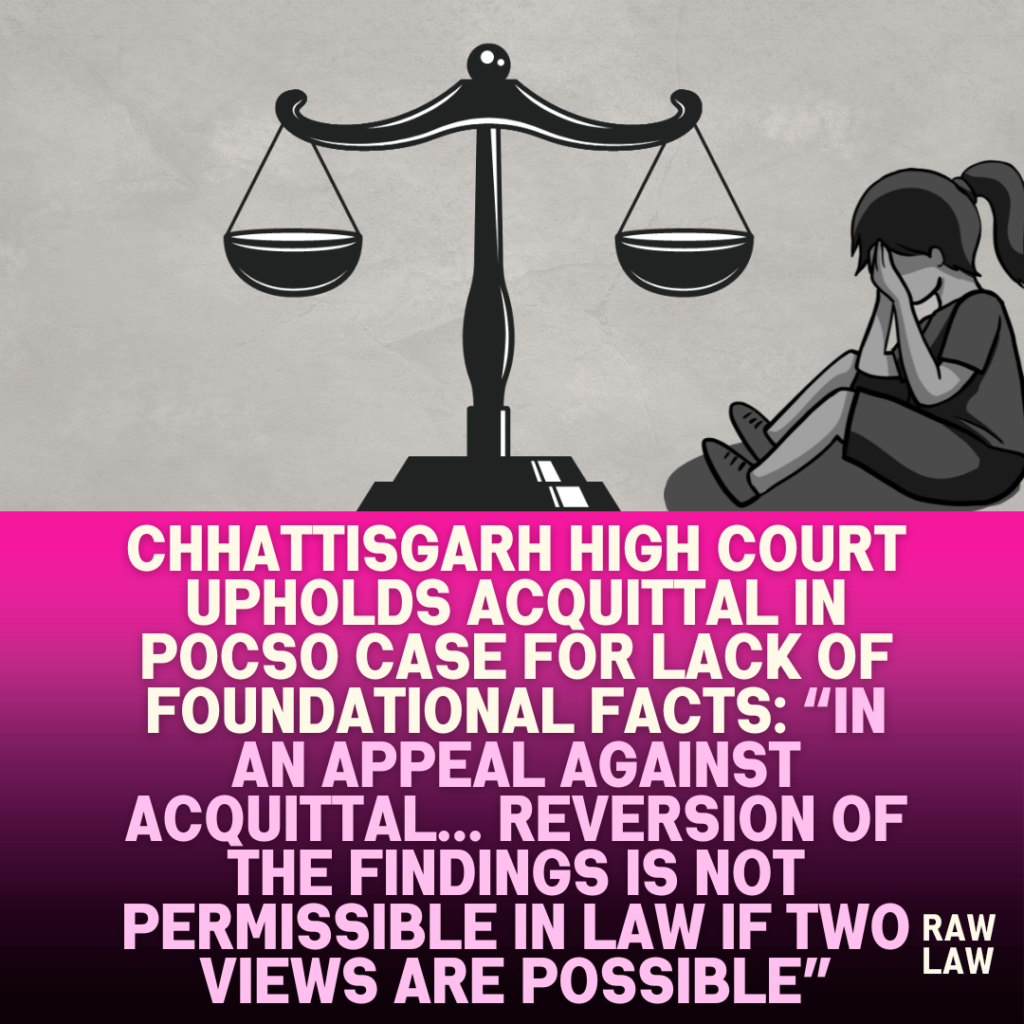Court’s Decision
The Chhattisgarh High Court, dismissed an appeal filed under Section 413 of the Bharatiya Nagarik Suraksha Sanhita, 2023 challenging the acquittal of the accused in a case under Sections 451 and 325 of IPC and Section 10 of the POCSO Act, 2012. The Court held that the trial court’s view was a plausible one based on the evidence and could not be reversed merely because another view was possible. The Court found that “the prosecution was unable to prove the offence” and reiterated that no interference was warranted with an acquittal unless the findings were perverse or unsupported by evidence.
Facts
The complainant, mother of a 10-year-old child, filed a complaint alleging that on 09.08.2022, her tenant (respondent no. 2) entered their house while her son was alone. She allegedly caressed the child, twisted his scrotum, causing swelling and immense pain. The child underwent surgery, resulting in removal of one testicle. A case was registered, and charges were framed under IPC Sections 451, 325, and Section 10 of the POCSO Act.
The prosecution presented 14 witnesses and 20 documents, including medical reports, police records, and the victim’s statement. The accused denied the allegations and claimed false implication, citing a dispute over the return of gold ornaments. She contended she had vacated the house on 27.07.2022, prior to the date of incident.
Issues
- Whether the trial court erred in granting acquittal despite the testimonies of key witnesses?
- Whether the presumption under Sections 29 and 30 of the POCSO Act could be invoked?
- Whether the evidence was sufficient to establish the guilt of the accused beyond reasonable doubt?
Petitioner’s Arguments
The appellant argued that:
- The statements of PW-1 (mother), PW-2 (elder mother), and PW-5 (victim) remained unshaken in cross-examination.
- The minor discrepancies did not detract from the overall reliability of the prosecution’s case.
- The trial court failed to appreciate the statutory presumptions under Sections 29 and 30 of the POCSO Act.
- The accused’s own admission of having vacated the premises on 27.07.2022 indicated her presence at the relevant time.
- The judgment was contrary to the law laid down in Ganesan v. State, (2020) 10 SCC 573 and Just Rights for Children Alliance v. S. Harish, 2024 SCC OnLine SC 2611.
Respondent’s Arguments
The respondent contended that:
- The FIR was lodged 11 days after the alleged incident without reasonable explanation.
- Medical evidence did not support the allegation — the first examining doctor found no swelling, and expert opinion indicated natural causes (like infection or playing).
- The accused had vacated the house prior to the date of incident and was not seen entering the house thereafter.
- The alleged act was of such severity that it should have necessitated immediate medical attention, but there was a delay in treatment.
- The trial court’s finding was based on plausible interpretation and thus immune from reversal in appeal, as held in Shivasharanappa v. State of Karnataka, (2013) 5 SCC 705 and Constable 907 Surendra Singh v. State of Uttarakhand, 2025 SCC OnLine SC 176.
Analysis of the Law
The Court analysed the applicability of Sections 29 and 30 of the POCSO Act, relying on the Supreme Court’s holding in Just Rights for Children Alliance:
“The statutory presumption… can be made applicable provided the prosecution is able to establish the foundational facts necessary to constitute a particular offence.”
The Court found that such foundational facts were missing. Medical expert PW-7 stated that testicular torsion could happen naturally, while playing, or due to unnoticed injury. PW-4 did not observe swelling when he first examined the child. The victim (PW-5) gave contradictory statements, and even acknowledged that the accused vacated the premises on 27.07.2022. No evidence proved that she entered the house thereafter.
Precedent Analysis
The Court relied heavily on Supreme Court precedents to reinforce the limited scope of appellate interference in acquittals:
- Constable 907 Surendra Singh v. State of Uttarakhand — Reiterated that interference is permissible only if the trial court’s view is perverse or based on a misreading of evidence.
- H.D. Sundara v. State of Karnataka, (2023) 9 SCC 581 — Acquittal reinforces presumption of innocence, and appellate courts should not disturb it if two reasonable views are possible.
- Rajesh Prasad v. State of Bihar, (2022) 3 SCC 471 — Laid down principles on reappreciation of evidence in acquittal appeals.
The appellant’s reliance on Ganesan and Just Rights for Children Alliance was found misplaced as the required foundational facts under POCSO were not proven in this case.
Court’s Reasoning
The Court found no perversity or illegality in the trial court’s judgment. It held that:
- Medical evidence suggested natural causes for the injury.
- The victim’s testimony was contradictory.
- There was no corroborative evidence to support charges of house trespass or sexual assault.
- Delay in lodging FIR remained unexplained.
- Benefit of doubt was rightly given to the accused.
The Court emphasized:
“In an appeal against acquittal… reversion of the findings… is not permissible in law… if two views are possible.”
Conclusion
The High Court held that the trial court had correctly appreciated the evidence and given the benefit of doubt. Since the prosecution failed to establish essential facts and no perversity was found in the acquittal, the Court dismissed the appeal.
Implications
This judgment reinforces the principle that acquittals carry a double presumption of innocence and that appellate courts must exercise caution in overturning them. It underscores the critical requirement of foundational facts for invoking POCSO presumptions and the need for timely, consistent evidence in sensitive offences.



